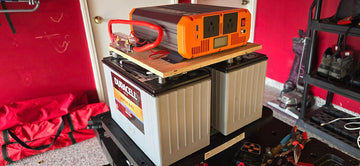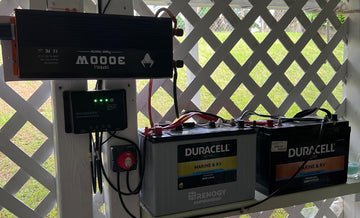In an increasingly energy-dependent world, choosing the right battery is critical. Lithium batteries stand out as a powerful and versatile solution for a wide range of applications. One of the most popular choices for lithium batteries is the 200Ah lithium battery . This blog will give you a comprehensive overview of 200Ah lithium batteries to help you make an informed decision.
Inside this Article:
- Learn about 200Ah lithium batteries
- Pros and cons of 200Ah LiFePO4 lithium batteries
- Common voltages and applications
- Common application breakdown for 12V
- How many hours can a 200Ah lithium battery last?
- How many 200Ah lithium batteries are needed to power a house?
- What size inverter is needed for a 200Ah lithium battery?
- 1 x 200Ah Lithoum battery or 2 x 100ah lithoium batteries?
- How much does a 200Ah lithium battery cost?
- Precautions when buying 200Ah lithium batteries
- Conclude
Learn about 200Ah lithium batteries
200Ah Lithium batteries are rechargeable batteries using lithium-ion chemistry, a technology known for its high energy density and efficient energy storage. Ah, or ampere-hour, is the unit of measurement for the capacity of a battery. 200Ah means that the battery is rated at 200 ampere-hours, which means that under ideal conditions the battery can deliver 200 amps of current for one hour of continuous power.
At the heart of a lithium battery is the movement of lithium ions between the positive (cathode) and negative (anode) electrodes. During discharge, lithium ions flow from the anode to the cathode, producing an electric current. During charging, the process is reversed and the lithium ions move back to the anode.
Key parameters
Parameters you need to know b esides battery capacity:
1️⃣Voltage
The voltage of a battery represents the potential difference provided by the battery, i.e. the voltage difference between the positive and negative terminals of the battery at which current flows. 12V batteries have a higher voltage than 6V batteries, which means they can deliver more power. Voltage compatibility is important. Ensure that the battery voltage meets the requirements of the equipment to avoid damage.
2️⃣Cycle Life
Cycle life is generally defined as the number of cycles a battery can be discharged to a given depth to maintain a given capacity. The higher the cycle life, the longer the battery will last, making it a more valuable investment.
3️⃣Self-discharge rate
The self-discharge rate is the rate at which a battery loses charge on its own when not in use. A lower self-discharge rate means the battery is better able to hold a charge, especially when stored for long periods.
4️⃣Temperature Range
The temperature range is the operating temperature at which a battery will perform optimally, and operating outside of this range can hurt battery performance and life.

Pros and cons of 200Ah LiFePO4 lithium batteries
The 200Ah LiFePO4 battery offers a compelling combination of benefits that make it the first choice for a wide range of applications.
High security: Compared to other types of lithium batteries (e.g. Li-ion batteries), they have higher thermal stability and safety, and are less likely to suffer from thermal runaway or explosion.
Long cycle life: LiFePO4 batteries have a long cycle life, typically over 2,000 charge/discharge cycles. This long life means lower maintenance costs and longer service life, making it a cost-effective choice in the long term.
Excellent thermal stability: LiFePO4 batteries offer high power stability over a wide range of temperatures and operating conditions, making them suitable for a wide range of environments.
Low maintenance: Lithium batteries require minimal maintenance compared to lead-acid batteries. They do not require regular replenishment of water or electrolyte, which simplifies operation and reduces the need for frequent inspections.
Environmentally friendly (no heavy metals):LiFePO4 batteries are environmentally friendly as they contain no heavy metals and are easier to handle and recycle when disposed of.
Although 200Ah Lithium batteries offer many advantages, there are some potential disadvantages to consider:
Relatively low energy density: Compared to other lithium battery types, such as Li-Ion batteries, LiFePO4 batteries have a lower energy density and are larger in size, which does not allow for a lighter design for the same capacity. However, they still have a higher energy density than lead-acid batteries.
Higher initial cost: LiFePO4 batteries are relatively expensive to manufacture, so they may have a higher initial investment cost in some application scenarios. However, their longer life and lower maintenance requirements can offset this initial investment over time.
Higher self-discharge rate: LiFePO4 batteries have a higher self-discharge rate than other lithium battery types, meaning that the battery loses its charge more quickly when stored or left unused for long periods of time.
Other Lithium Battery Types:
1️⃣Lithium nickel manganese cobalt oxide (NMC): Balancing power and stability
NMC batteries combine high power with good stability. They are often used in applications where a balance of power and durability is required, such as e-bikes and power tools.
Pros:
- Relatively high energy density
- Good power output
- Relatively long cycle life
- The ratio of nickel, manganese, and cobalt can be adjusted as required to balance power output, capacity, and cycle life
- Slightly less safe than LiFePO4
- More prone to degradation at high temperatures and may not be as thermally stable as some other types of lithium batteries.
- Nickel has an effect on capacity degradation in NMC batteries
- Cost may be higher in NMC batteries with high nickel content
2️⃣ Lithium Cobaltate (LCO): A popular choice for electronic products
LCO batteries have high energy density and relatively low cost and are commonly used in consumer electronics. They provide good performance for devices such as smartphones and laptops, but are not as long-lasting and safe as LiFePO4 or NMC.
Pros:
- High energy density, high electrical energy storage capacity
- LCO batteries have relatively low internal resistance, which can provide high discharge efficiency and reduce energy loss.
- LCO batteries have high voltage smoothness and can provide relatively stable voltage output, which is beneficial for some applications with high voltage requirements.
- Relatively low cost
Cons:
- Shorter cycle life compared to LiFePO4 and NMC
- Lower thermal stability, Li-CoO2 batteries are more sensitive to temperature changes.
- The capacity of Li-CoO2 batteries may degrade during cycling, and the usable capacity of the battery may gradually decrease as the number of cycles increases.
Common voltages and applications
The 12V 200Ah lithium battery is a popular choice for a variety of applications including solar, marine and RV. Lightweight and portable, they are easy to install and transport. 12V 200Ah Lithium batteries offer high performance and long life. They provide reliable power for basic appliances, lighting and electronics, offering convenient and efficient energy.

24V 200Ah lithium batteries are commonly used in small electric vehicles such as golf carts and utility vehicles, as well as backup power systems for homes and businesses. Their higher voltage provides greater power output for these applications.

48V 200Ah Lithium Battery
48V 200Ah Lithium batteries are increasingly being used in large energy storage systems such as large electric vehicles (e.g. buses and trucks), large residential and commercial buildings. Their high energy density and high power capability make them an efficient and reliable choice for high power applications.

Common application breakdown for 12V
Although 200Ah lithium-ion batteries are available in a variety of voltages, the 12V model is particularly popular due to its versatility.
Solar energy storage: Harnessing the sun's energy
How it works: 12V 200Ah lithium-ion batteries are perfect for storing solar energy generated by photovoltaic panels . They provide reliable power for homes, businesses and off-grid systems.
Key benefits:
- Long service life
- High energy storage capacity
- Safe and reliable operation
Caravan and marine: power anywhere, anytime
How it works: 12V 200Ah lithium-ion batteries power essential appliances and systems in recreational vehicles (RVs) and boats. They provide reliable power for lighting, navigation, fridges, water pumps and other amenities.
Key benefits:
- Compact size and light weight
- High capacity for extended off-grid use
- Efficient charging capability
Backup power: Ensures continuity during power outages
How it works: 12V 200Ah lithium-ion batteries can be used as a backup power source during a power outage to keep critical equipment in the home running, such as refrigerators, lighting, computers and medical equipment.
Key benefits:
- Reliable power supply in emergency situations
- Long runtime for extended power outages
- Safe and stable operation
How many hours can a 200Ah lithium battery last?
The runtime of a 200Ah lithium battery depends on the power (W) consumed by the load connected to the battery. To calculate the runtime of a 200Ah lithium battery, you need to know the power of the equipment and the battery voltage.
If you have a 12V 200Ah lithium battery and want to run a 500W device.
Runtime = Battery Capacity (Ah) x Battery Voltage (V) / Appliance Wattage (W)
Using the above formula, the runtime of a 12V 200Ah Li-ion battery is: 200Ah x 12V / 500W = 4.8 hours
In this case, a 200Ah Li-Ion battery can power the unit for 4.8 hours, assuming the unit continues to consume power at 500W. However, actual usage time may vary depending on factors such as device power variations, battery status and discharge rate.

How many 200Ah lithium batteries are needed to power a house?
The number of 200Ah Li-ion batteries required to power a home depends on the amount of energy consumed in the home and the amount of back-up power required.
The first step is to determine the amount of energy used by the household on a daily basis, usually measured in kilowatt hours (kWh). This can be calculated by looking at the power consumption of electrical appliances in the home and estimating the time of day they are used. A typical household uses about 10-20 kWh of electricity per day.
You can work out how many 200Ah lithium batteries you need based on the household's daily energy consumption and the length of time it needs to be powered. Assuming that the household consumes 10kWh of energy per day and that one 200Ah lithium battery can provide power for 5 hours, then the number of batteries required is: (10×1000)÷(200×5)=10
In this case, about ten 200Ah lithium batteries are needed to cover the household's daily energy needs.
What size inverter is needed for a 200Ah lithium battery?
The size of the inverter will vary depending on the power required from the batteries. Knowing the maximum power required from the battery will help you choose the right size inverter. The power capacity of the inverter should be able to support the power requirements of the connected devices and the output voltage should match the battery voltage.
For a 200Ah battery, the first thing to consider is the voltage of the battery. If it is a 12V battery, then when choosing an inverter you need to make sure that the input voltage range of the inverter includes 12V and that the output voltage is suitable for domestic appliances.
Next you need to consider the power capacity of the inverter. If your batteries consume 1,000 watts, you will need an inverter that can provide at least 1,000 watts of continuous power.

1 x 200Ah Lithoum battery or 2 x 100ah lithoium batteries?
It is often advantageous to choose two 100Ah LiPo batteries rather than one 200Ah LiPo. This is because the dual battery setup provides back-up functionality and more flexibility in installation.
For example, assuming you carry two 100Ah LiPo batteries, if one fails or needs to be replaced, you can still rely on the other to provide power. In addition, having two smaller batteries instead of one larger one increases installation flexibility, especially when space is at a premium.

How much does a 200Ah lithium battery cost?
Prices for 200Ah lithium batteries vary according to brand, specification and features. Prices typically range from $500 to $1,500, with higher performance batteries and batteries with additional features costing more.
TOPBULL offers a wide range of high quality lithium batteries at great prices: View More
Precautions when buying 200Ah lithium batteries
The following factors should be considered when selecting a 200Ah Lithium battery:
- Battery brand and quality
- Voltage and capacity requirements
- Type of application
- Installation requirements
- Charging and discharging specifications
- Price and warranty
Conclude
200Ah Lithium batteries are a popular choice for a wide range of applications. Understanding their features, benefits and key parameters will help you make an informed decision when choosing the right battery for your application. Whether you're powering an RV, electric vehicle or solar system, 200Ah lithium batteries offer reliable, efficient and long-lasting performance to meet your energy needs with advanced technology.













